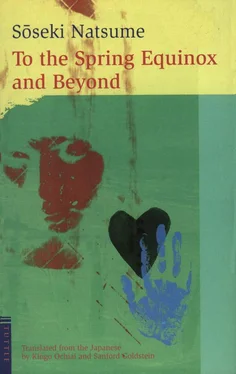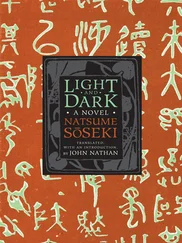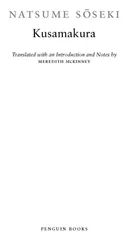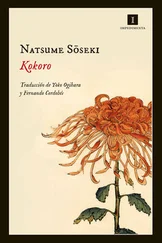Natsume Soseki - To the Spring Equinox and Beyond
Здесь есть возможность читать онлайн «Natsume Soseki - To the Spring Equinox and Beyond» весь текст электронной книги совершенно бесплатно (целиком полную версию без сокращений). В некоторых случаях можно слушать аудио, скачать через торрент в формате fb2 и присутствует краткое содержание. Год выпуска: 2006, Издательство: Tuttle Publishing, Жанр: Классическая проза, на английском языке. Описание произведения, (предисловие) а так же отзывы посетителей доступны на портале библиотеки ЛибКат.
- Название:To the Spring Equinox and Beyond
- Автор:
- Издательство:Tuttle Publishing
- Жанр:
- Год:2006
- ISBN:нет данных
- Рейтинг книги:5 / 5. Голосов: 1
-
Избранное:Добавить в избранное
- Отзывы:
-
Ваша оценка:
- 100
- 1
- 2
- 3
- 4
- 5
To the Spring Equinox and Beyond: краткое содержание, описание и аннотация
Предлагаем к чтению аннотацию, описание, краткое содержание или предисловие (зависит от того, что написал сам автор книги «To the Spring Equinox and Beyond»). Если вы не нашли необходимую информацию о книге — напишите в комментариях, мы постараемся отыскать её.
To the Spring Equinox and Beyond — читать онлайн бесплатно полную книгу (весь текст) целиком
Ниже представлен текст книги, разбитый по страницам. Система сохранения места последней прочитанной страницы, позволяет с удобством читать онлайн бесплатно книгу «To the Spring Equinox and Beyond», без необходимости каждый раз заново искать на чём Вы остановились. Поставьте закладку, и сможете в любой момент перейти на страницу, на которой закончили чтение.
Интервал:
Закладка:
He walked around and around the streets in Yarai and noticed that many of the houses had the same numbers on them. He entered a small side street and followed it to the right and then the left, looking over the drenched hedgerows at the houses behind them until he came to the front of an enclosure, apparently a graveyard, surrounded by aged camellia trees. It seemed that Matsumoto's house was not going to be so easy to find. He finally tired of his search and, coming upon a rickshaw station at a corner, asked a young runner for directions. The rickshawman informed him of the location as though it were the easiest thing in the world to find.
Matsumoto's dwelling was pleasing to the eye. It had a bamboo fence around it at the end of a side street whose entrance was diagonal to the rickshaw station. As Keitaro passed through the gate, he heard the sound of a drum being beaten by a child. Even when he reached the porch and called out for admission, the sound did not stop. Except for that sound, the house was so quiet that it seemed devoid even of human smells.
At last a fifteen- or sixteen-year-old maid appeared from the further end of the house shut in by the pouring rain, bowing with her hands on the tatami. As soon as she took the letter from him, she withdrew without a word. A few minutes later she returned and said, "We're very sorry, but it's not convenient for us to see you now. Would you come again on another day, when it isn't raining?"
This excuse sounded strange to Keitaro, even though he was accustomed to being rejected at various places he had visited in search of employment. He was at once tempted to retort as to why her master was hindered from seeing a guest on a rainy day. But to argue with a maid was improper, so instead he merely asked — to make certain as well as to vent his disappointment— "Then shall I be allowed in if I come on a fine day?" The maid merely replied, "Yes."
Keitaro could do nothing but head out into the rain again. He could still hear the child's drumbeat through the violent downpour. That there existed a man this strange was the thought recurring again and again to Keitaro as he descended Yarai Slope. He wondered if this was not what Taguchi had meant when he had told him that Matsumoto was not an easy person to see even on ordinary matters. If Keitaro returned directly to his lodging, he would be annoyed the entire day, unable to proceed in any direction, his mood forcibly rooted in a state of suspension. So he thought of calling on Sunaga, whom he had not seen for some time, and spending the afternoon by telling him over tea what had happened during this period. But thinking again, he realized that if he went to see him at all, it would be better to wait until he had reached some conclusive stage where he could announce the plot of the story after it had sufficiently been revealed to himself, for otherwise it would not make a good tale. So he gave up the idea.
The next morning was fine, quite the opposite of the previous day. As he rose, Keitaro looked up at the dazzlingly bright blue sky, all its impurities having been washed away by the force of the rain, and he rejoiced that he could certainly see Matsumoto this very day. He took the walking stick from behind the wicker trunk, where from that other night he had kept it, thinking he might just take it with him.
As he went up Yarai Slope for the second time, cane in hand, he imagined what he would feel like if the same maid appeared and announced that the occupants were sorry for the trouble he had taken, but they had to request he come some other time when it was a little more cloudy, this being too fine a day!

Unlike the previous day, however, Keitaro heard no child's drumbeat as he passed through the gate. And in the hall there was a screen that he had not noticed before. It had a single crane on it drawn in light India ink, but what attracted Keitaro's attention was its elongated shape. It was different from usual screens, shaped more like a full-length mirror. As he had expected, the same maid answered his call, but behind her came two children with loud, ill-mannered footsteps. They peeped at him as though he were quite a singular phenomenon. Having recognized this much of a difference from the day before, he was at last led inside by the maid and shown into a drawing room whose glass sliding doors were all closed. In the middle of the room was a porcelain brazier as large as a fishbowl. On either side of this the maid set down circular cushions with an Indian calico print and indicated the one for Keitaro. As he sat down on it, its shape gave him an odd sensation. On the wall of the alcove hung a scroll whose landscape was drawn with the careless bold strokes of a rough brush. Unable to distinguish the trees from the rocks, he looked upon it as an ornament deserving only contempt. The gong next to the scroll, to which a stick had been attached, gave him further evidence of the room's strangeness.
The sliding partition between the rooms opened and from the other side came his mole-browed host. Saying, "Thank you for coming over," he sat down directly opposite Keitaro. His greeting was far from engaging — he hardly seemed to attach any importance to his guest — yet there was something magnanimous about his manner. Keitaro felt all the more at ease for this. He was thus not made to feel much constraint, even though they were sitting face to face with only the brazier between them. Furthermore, in spite of thinking that his host would certainly remember the face he had seen the other night, Keitaro found that Matsumoto's serene manner as they were seeing each other again revealed in neither word nor look the slightest sign as to whether he remembered it or not, so Keitaro sensed he had still less to be reserved about. And finally, his host said not a word by way of reason or apology for refusing the interview the day before due to the rain. Keitaro had no way of judging whether the man did not wish to refer to it or saw no cause for having to.
Their talk began naturally enough with Taguchi's introduction. After first ascertaining that Keitaro was looking for a position through Taguchi, Matsumoto asked general questions about the kind of work Keitaro desired and about his university record. Keitaro found himself troubled by the finicky topics Matsumoto kept bringing up, for example, Keitaro's view of the world and of life itself, topics he had never thought about. From time to time Matsumoto showed such flashes of curious logic that Keitaro suspected he was one of those men of learning unacknowledged by the world. And not only that. Matsumoto berated Taguchi, setting him down as a useful man but one deficient in brain power.
"First of all, a life as busy as his just won't do. It provides no leisure with which to build any system of thought. The brains of that man are exactly like bean paste beaten all year round by a wooden pestle in a mortar. They're so perpetually in motion they have no form, no shape."
It was quite beyond Keitaro's comprehension why his host was using such abusive language toward Taguchi. But what really seemed odd was that neither in Matsumoto's attitude nor in his tone did there appear anything malignant or repellent in spite of the bitterness of the words he used. This abusive language, when heard through a voice so calm that it seemed never to have been used for scolding, did not provoke in Keitaro's mind any strong contradiction. It merely served to provide a fresh stimulus to his impression that Matsumoto was indeed unique.
"And yet he plays go, recites from Noh texts, and dabbles in an assortment of other hobbies. Of course in each of these he's quite inept."
"Isn't that evidence that he does have some leisure time?"
"Leisure — you call that leisure? I declined to see you yesterday because it was raining and asked you to come again when the weather was fine, didn't I? There's no need to explain why now, but do you think in all the world there's a more capricious reason for declining to see anyone? If it had been Taguchi, he'd never have been able to refuse in that way. Why is it that he is so willing to see people? It's because he's a man who wants something from the world. In other words, he's not a high-class idler like me. He doesn't have the leisure which allows one to remain unconcerned no matter how much offense he gives others."
Читать дальшеИнтервал:
Закладка:
Похожие книги на «To the Spring Equinox and Beyond»
Представляем Вашему вниманию похожие книги на «To the Spring Equinox and Beyond» списком для выбора. Мы отобрали схожую по названию и смыслу литературу в надежде предоставить читателям больше вариантов отыскать новые, интересные, ещё непрочитанные произведения.
Обсуждение, отзывы о книге «To the Spring Equinox and Beyond» и просто собственные мнения читателей. Оставьте ваши комментарии, напишите, что Вы думаете о произведении, его смысле или главных героях. Укажите что конкретно понравилось, а что нет, и почему Вы так считаете.












